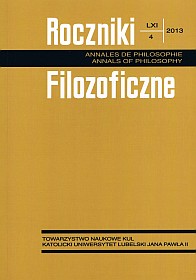The Illusion of Buddhist Liberation in Emil Cioran’s Thought
Abstract
Wishing to defeat or silence a fear of death and not being able to find support from religion, neighbours, culture and ideas, turns Emil Cioran towards the philosophy of the East. Buddhism, which is not an institutionalized religion, refers to reflection and a cognitive effort, and aims at the purification of the consciousness from illusions of the external world. Those illusions create a number of attachments and desires and in this way, they arouse in a man constant anxiety and suffering at the thought of disappointment, failure and loss. In striving for purification from illusions, desires and sufferings, Cioran reaches for Buddhist contemplation techniques over what is left from a man after death, and for the Buddhist notion of emptiness, which helps in removing the content from the world, and thanks to all of this, the fear of death disappears, the impression of undisturbed completeness and happiness is attained, moreover, the state of blissful indifference is achieved. Ultimately, the author of Drawn and Quartered cannot consent to such an existential limbo and imputes to Buddhism, that by renouncing desires, attachments and sufferings, in fact, it renounces life due to pointless indifference, it creates only an illusion of liberation, in the essence, it is strange for a man from the West and therefore, it quickly arouses a desire for a re-involvement in the agitated course of illusions, objects, issues, passions and a common pursuits.
References
Kania I.: Nihilista pielgrzymujący, [w:] E. Cioran, Na szczytach rozpaczy, tł. I. Kania, Kraków: Oficyna Literacka 1992.
Copyright (c) 2013 Roczniki Filozoficzne

This work is licensed under a Creative Commons Attribution-NonCommercial-NoDerivatives 4.0 International License.





